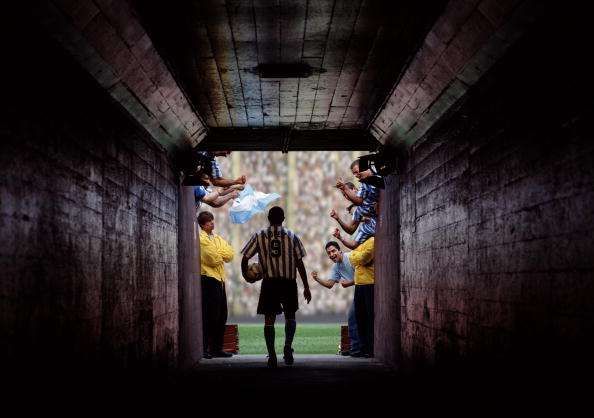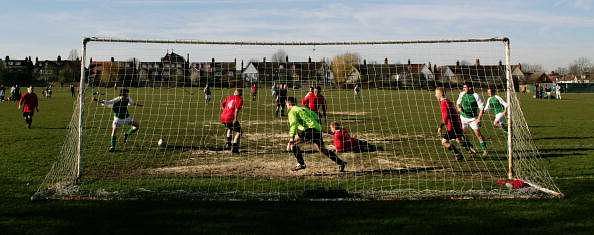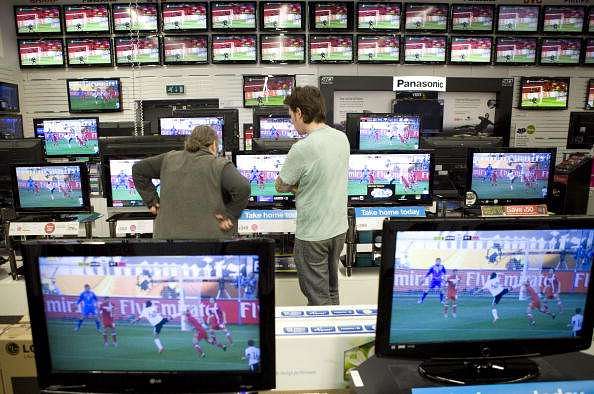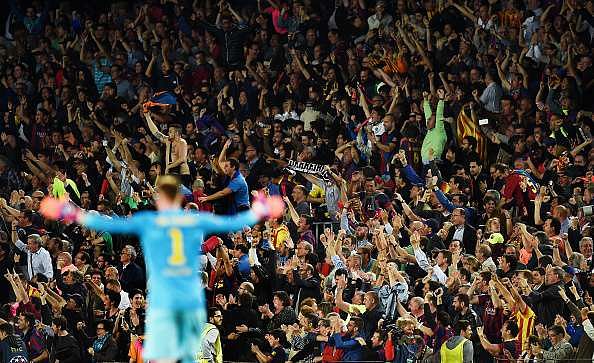
Why is football the most popular sport in the world?
Ariana and Leo rushed into their London flat breathless - fuming at the keyhole as it took 5 seconds to turn the latch - and switched on the television. The screen took a further few seconds to come to life and navigating to a channel of their choice ate up some more time; both cursed under their breath until the familiar face of Eden Hazard showed up onscreen. The game was ten minutes in but still goalless. The couple heaved a sigh and plopped up on their bean bags in front of the TV.
Half a world away, Ade stood outside an electronics store in Accra, as the mammoth television on display - facing the streets - telecasted the game live. Would Lionel Messi run circles around his opponents and volley another one into the net from range tonight, the 7-year-old wondered.
Kiara and Nidhi had invited their friends in Mumbai for dinner over a football game; fewer things could excite the siblings more than watching the North London derby at the weekend. Their invitees included a few Spurs fans as well; as they sat down to watch, the girls offered a silent prayer in favour of the Gunners. Pride, bragging right and 3 points – there was a lot at stake tonight.
Somewhere in California, Kieran – a first-year student – went down to his hostel TV room, wearing his treasured Steven Gerrard jersey. As he walked in, a swarming crowd singing ‘You’ll Never Walk Alone’ in tune with the telecast greeted him. A reticent newcomer had become one among the rest.
Can you identify with some of these stories/incidents? Surely, you have your own to share, maybe? With over an estimated half of the world’s population – that is, more than 3.5 billion of us – tuning in to watch ‘the beautiful game’, it would be a surprise if every other person could not connect with at least some of this.
So, why is football popular? What makes so many of us forget our surroundings and immerse ourselves in this sport – be it watching or playing it or both? After all, it is just a case of twenty players trying to find a way to get the ball into the opposition net and two others trying to stop a goal (oversimplification at its best, it is not?).
There are a host of reasons to explain the popularity of the game, not least of it being the reach afforded to it thanks to international broadcasts and the advent of online streaming.
Simplicity
Football is a fairly simple game to comprehend when you start watching. Two teams on the pitch, 11 men/women on each team; the sole objective is to score one more goal than the opponent.
Sure, there are the off-sides, corners, rules for yellow/red cards and other technical aspects but all these can be understood and learnt in time. At the outset, all you need to know is the goal-scoring aspect and this is not difficult for a newbie to catch on to.
Duration
A game lasts 90 minutes – less than the average running time of a movie and offers a visual treat like no other. In an age of instant gratification and decreasing attention span, the limited time offers a refreshing change.
Also, no commercial interruptions every five minutes trying to showcase the latest razor/beer/whatever else there is to sell – surely a bonus?
Accessibility
The game enjoys wide television coverage, with the World Cup broadcast in over 200 countries and the final watched by over a billion people!
The English Premier League is the most widely covered and the TV rights offered to the clubs are worth multi-million pounds; La Liga, Bundesliga and Serie A have their own sets of star attractions, competitiveness and Champions League titles and are trying their best to seduce the modern football fan with their recent successes.
Availability
Football is played all year round – either at association level (club football) or at international level. There are local as well as European leagues and championships to watch, player sales to keep tabs on during the transfer windows, pre-season games where the best in the world could come play in your city and then of course, the mother of it all – the World Cup every four years.
In addition to this the Euros, Copa America are all prestigious competitions in their respective demographies and cause frenzy among the international audience tuning in.
Colonial imperialism and local leagues
There is an undeniable influence of the colonial culture in establishing a deep-seated affection for the sport in the 19th century, as European rule extended beyond the continent’s borders.
In nations where there was no dominant local sport, there was an untapped opportunity to set up the base for football.
Today, over 50 countries worldwide have their own local leagues which are popular nationally and often multi-tiered. The nature of said system inspires a fierce sense of loyalty owing to regional belonging, love for a player etc.
Cost-effective and inclusive
Kicking a ball around comes at almost zero cost when you start playing. Unlike other sports, it does not require expensive gadgets and accessories – unless you decide to go pro, of course, at which point the club will foot all expenses.
The game does not discriminate on the basis of gender, with the women’s game also an enticing avenue of talented players. Size, height, nationality, race are all immaterial as long as the individual possesses skills and passion to play, combined with pace (optional, again), agility and awareness of surroundings.
The beauty of the game
It would be an understatement to say that sporting legends and iconic figures have featured for the game, whether on the pitch or as part of the coaching staff or both. Be it the Dutch ‘total football’ or the ‘pass and move’ of the Spaniards, the English fight-to-the-finish or the Italian keep-them-at-bay-at-all-costs, there are fans who enjoy each of these variants across the world.
‘Handed down’
While some of us started out afresh, there are many whose parents/uncles/aunts/cousins have been fans of the game for generations.
Loyalties are passed down like a treasured family heirloom and if you dare to choose a different/opposing team, you are likely disowned at least for the duration of the game (and during the course of any arguments/debates related to it thereafter).
Sporting icons

For generations, we have been enamoured watching the likes of Alfredo Di Stefano, Diego Maradona, Johann Cruyff, Zinedine Zidane, Ronaldo, Ronaldinho Gaucho, Thierry Henry, Andrea Pirlo, Leo Messi, Cristiano Ronaldo, Kun Aguero and other tearing the defence apart before going through on goal.
There is an equally long and worthy list of world-class defenders and goalkeepers who gave these attackers nightmares. It is virtually impossible to make a list of players who have influenced our lives in ways small or big, which eventually makes us want to watch them over and over again.
90 minutes of alternate reality

During his first interview after being appointed as Liverpool’s coach in October 2015, Jurgen Klopp said:
Football is not important – we don’t save lives, we are not doctors – the fans can forget their problems for 90 minutes. The fans can talk about the game for days, and that is why I try to be as close as possible to the fans, it’s why I love this job so much.
It may seem simplistic and somewhat naive but there is a lot of truth to this statement. Football is a wonderful, engaging distraction – a welcome relief from the rigours of everyday routines, chores and stress (it is admittedly stressful if your team loses or is in trouble but that is a different discussion). In rooting for your team, it offers a chance to be associated with the best from across the world. Not too bad, eh?
The most popular sport in the world is fast, dynamic, adaptive, inclusive and thrilling, taking us on a journey of ups and downs over the course of an hour-and-half. It is this diversity and nature of the game that makes it so appealing to the inhabitants over the expanse of our planet.



